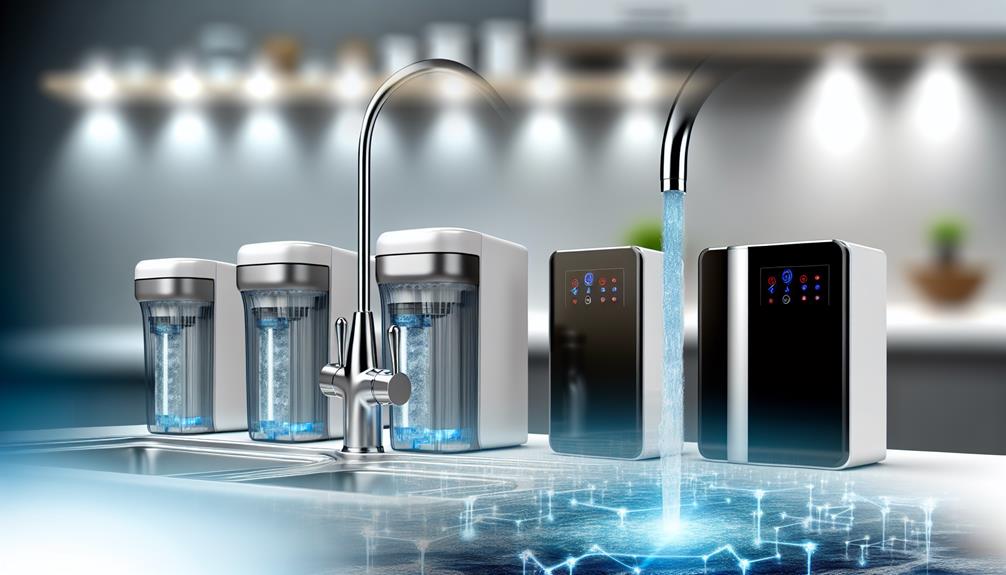You've likely heard the theory that innovation in eco-friendly filtration technology is not just a trend, but a burgeoning field with the potential to drastically reshape our environmental impact.
As you explore the latest advancements—from advanced membrane bioreactors to nanotechnology-enhanced filters—it becomes clear that these aren't mere incremental improvements, but rather transformative solutions aimed at addressing the critical issues of water scarcity and pollution.
The integration of smart monitoring and the Internet of Things (IoT) into these systems marks a leap forward in efficiency and user engagement.
But what does this mean for you and the future of our planet's water resources?
As you consider the implications of these breakthroughs, consider also the unseen challenges and opportunities they may bring to the surface.
Advanced Membrane Bioreactors
How do Advanced Membrane Bioreactors revolutionize water treatment by enhancing filtration efficiency and sustainability?
By incorporating state-of-the-art membrane technology, these advanced systems significantly improve water quality. Unlike traditional water purification methods, advanced membrane bioreactors effectively remove contaminants from water through a finely tuned process that minimizes the need for chemicals and reduces energy consumption.
You'll find that these filtration solutions aren't only high-performing but also represent a leap toward sustainable water treatment. The integration of advanced membranes allows for a precise separation of pollutants, often surpassing the capabilities of conventional activated carbon systems. This precision contributes to the eco-friendly nature of the process, as it limits the generation of waste and avoids the unnecessary use of additional purifying agents.
The versatility of membrane bioreactors is notable—they cater to a wide range of filtration needs, making them suitable for various applications, from municipal to industrial. With ongoing research and development, these systems continue to evolve, promising an even more water-secure future that hinges on eco-friendly water treatment practices.
This innovation exemplifies a commitment to environmental responsibility while ensuring access to clean water.
Nanotechnology-Enhanced Filters
Harnessing the power of the infinitesimal, nanotechnology-enhanced filters mark a significant breakthrough in water purification, delivering exceptional filtration efficiency through the use of materials at the nanoscale. These advanced technology filters stand out for their ability to remove contaminants with precision, ensuring safer drinking water. You'll find that these filters can finely separate harmful agents from water without the bulk of traditional systems.
Here are some key features of nanotechnology-enhanced filters:
- Tailored Membrane Solutions: Engineers design membranes with enhanced selectivity to target specific particles and contaminants.
- Reduced Environmental Impact: These filters help in reducing plastic waste and cutting down the overall carbon footprint.
- Exceptional Purity: Able to remove bacteria, viruses, heavy metals, and even microplastics, ensuring water quality is uncompromised.
- High Throughput: Membranes are engineered to allow water molecules to pass freely while blocking contaminants, maintaining high flow rates.
- Innovative Materials: Use of graphene oxide and other nanomaterials increases the durability and effectiveness of the filtration process.
Biological Water Treatment Systems
While nanotechnology-enhanced filters offer precise contaminant removal, biological water treatment systems provide a natural alternative by utilizing microorganisms to purify water. These systems embody sustainability, leveraging life processes to treat water. By harnessing bacteria and other microorganisms, they break down and remove contaminants efficiently from various water sources.
Biological water treatment systems aren't just environmentally friendly; they're also a nod to advanced technology harmonizing with nature. Unlike traditional methods that rely heavily on chemicals and high energy inputs, these systems significantly reduce energy consumption. This is achieved through mimicking processes found in natural wetlands, where plants and microorganisms work in tandem to cleanse water.
The integration of these systems represents a shift towards filtration technology that respects and preserves ecological balance. By maintaining the natural biota, they contribute to the health of ecosystems, providing a dual benefit of water purification and environmental conservation.
You'll find that these systems are cost-effective as well, offering a long-term solution for managing water purity without the ongoing expense and environmental impact of chemical treatments. Deploying biological water treatment is a step towards a future where technology and nature coexist for a cleaner, more sustainable world.
Energy-Efficient Desalination Techniques
Innovative energy-efficient desalination techniques are transforming the way we extract fresh water from the sea, significantly reducing energy requirements and lessening ecological footprints. These methods use advanced technology to offer significant advantages over traditional methods, such as conventional reverse osmosis, by enhancing water recovery rates and lowering operational costs.
- Forward Osmosis: This process has lower energy demands compared to conventional reverse osmosis and boasts higher water recovery rates, making it a sustainable alternative.
- Advanced Filtration: Nanofiltration membranes play a crucial role in removing contaminants more efficiently, which contributes to reduced energy usage.
- Renewable Energy Integration: Pairing desalination plants with renewable energy sources, like solar, can drastically cut down on the carbon footprint of fresh water production.
- Thermal Techniques: Innovations in thermal desalination processes are increasing efficiency, aiming to surpass the energy-intensive methods of the past.
- Energy Recovery Systems: These systems capture and reuse energy within the desalination process, leading to considerable savings in energy costs.
Smart Monitoring and IoT Integration
As filtration systems become more sophisticated, integrating smart monitoring and IoT enables you to precisely track and manage water quality and system maintenance in real-time. This convergence of innovative water strategies and cutting-edge technology continues to evolve, allowing for the implementation of sustainable water solutions that are both energy-efficient and effective.
The Internet of Things (IoT) serves as a backbone for these advancements, providing seamless connectivity between water filtration systems and other smart home devices. By utilizing advanced sensors and controls, smart water management becomes a reality. This technology allows for proactive adjustments to ensure optimal filtration performance, minimizing waste and conserving resources.
Moreover, smart notifications alert you to maintenance needs, ensuring that the upkeep of your filtration technology is both efficient and timely. The integration of IoT and smart monitoring in water filtration systems isn't just about convenience; it's about crafting a future where water usage is sustainable, and energy consumption is minimized.
In essence, as you embrace these eco-friendly filtration innovations, you're not just adopting energy-efficient devices but investing in a smarter, more responsive, and responsible way of managing the precious resource of water.

